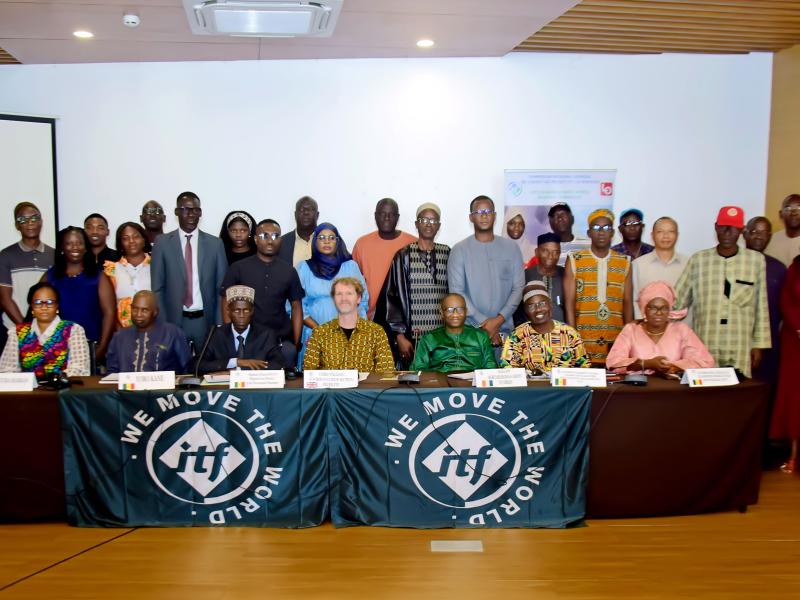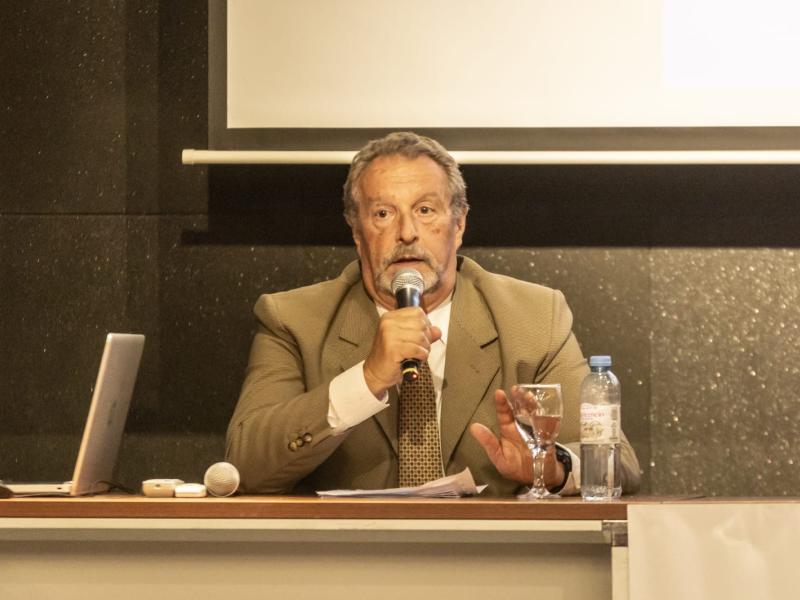- At least 25,000 truckers are expected to join an indefinite strike over the government’s failure to live up to its promises on Safe Rates legislation
- An eight-day strike by truckers in June over the same issue was estimated to have cost the South Korean economy USD $1.2 billion and sent shockwaves through global supply chains
Truck drivers in South Korea will strike indefinitely from midnight on 24 November after the government sparked fury by reversing its promises on Safe Rates legislation.
The International Transport Workers’ Federation (ITF) affiliate Korean Public Service and Transport Workers’ Union (KPTU-TruckSol) called a halt to a strike in June after eight days when the government and industry agreed to continue and expand the Safe Rates programme. But since then, the government has caved to pressure from big business and done everything possible to block progress.
In response, KPTU-TruckSol has called a new unlimited national strike. Workers are set to rally and block ports, petrochemical and industrial sites, and logistics hubs around the country. Truckers feel betrayed by the government and more that 25,000 union members are likely to be joined in their action by other drivers. The ITF and affiliated unions around the globe have offered their whole-hearted support to Korean workers.
“The government is backtracking on its promise to the determent of workers and public safety,” said Bongju Lee, KPTU-TruckSol President. “We are prepared to strike until that changes. Legislation to make Safe Rates permanent and expand coverage must pass in the National Assembly. It’s as simple as that.”
How Safe Rates should work
Safe Rates sets standards for safe and fair rates of pay for workers and makes large companies that contract road transport services responsible for ensuring that these standards are met throughout their supply chains. The system was introduced in South Korea in 2020 under a temporary law which will expire at the end of this year unless law makers pass legislation to continue it. The original law only applies to the haulage of bulk cement and containers. Unions have been campaigning for the system to be made permanent and expanded. In June, the government agreed in continuing the system and to actively discuss extending its coverage to more trucks, but has sense retracted this position.
“The rationale for Safe Rates is simple common sense,” said Stephen Cotton, General Secretary of the ITF. “By giving drivers decent pay and working hours, there are fewer accidents on the roads. It’s been shown to save lives – not just truck drivers’ lives but those of other road users too.
“The South Korean government has been swayed by an industry suffering tunnel vision – focused on ridiculous short-term cost-cutting. Long term, Safe Rates actually creates a better environment for businesses.
“If the government does not continue and expand this system, how is it going to explain itself to a voter whose loved one is killed in a highway accident? Strikers want decent pay and conditions for workers. But in the final analysis, this is about standing up to big business to make the roads safer for everyone.”
Union condemnation
66 ITF affiliated unions from around the world have signed an open letter condemning the South Korean government and ruling People Power Party (PPP) for breaking their promises to workers. They have failed, it says “to prevent a strike that will cause enormous short-term damage to the Korean economy, to critical national and global supply chains, and to Korea’s global reputation.” The government is seeking to gut a system that has been shown to improve road safety and save lives.
The strike comes against a backdrop of increasing unrest among transport and public sector workers in South Korea generally, as the conservative ruling party emphasises profit at the expense of worker and passenger safety.
“We’re demanding that the government starts working with unions rather than against them,” said Cotton, “to make the vital transport industry efficient, offering workers decent rates of pay and conditions and, above all, making the industry safe for everyone. It’s time to live up to the promise that Safe Rates offered when it was adopted in 2020. Make it permanent, give it the broadest possible reach and restore Koreans’ pride in their reputation for safety improvement.”
The letter can be downloaded here in English and Korean.
For more information, contact: media@itf.org.uk
NOTES FOR EDITORS:
Expected impact
The strike will begin at 12:00am 24 November KST (15:00 23 November GMT). KPTU-TruckSol expects is full membership of 25 thousand truck drivers to participate in the strike.
While union membership is only a fraction of the full road transport workforce (430 thousand), members are concentrated in important sectors including shipment of import/export containers, cement, steel, automobiles, and petrochemicals. The union’s membership includes drivers throughout the automobile supply chain, putting this sector on particular alert. Since the previous strike in June, union density among tank lorry drivers has grown to over 50% meaning that fuel shipments will be heavily affected.
Earlier this year (7-14 June), a strike involving tens of thousands of unionised and non-member truck drivers rocked the Korean economy and global supply chains. Drivers rallied at dozens of production and logistics hubs around the country for 8 days effectively blocking transport. The South Korean government estimated the total impact to the Korean economy to have been KRW 1.6 trillion (USD 1.2 billion). Transport in and out of the Port of Busan and other major ports was blocked and production and shipment of major export goods all but ground to a halt. The union will use similar tactics during the upcoming strike.
Heavy-handed government response
During a joint meeting of the Yoon Seok-yeol administration and ruling People Power Party (PPP) on 22 November, PPP lawmakers labelled the strike illegal while representatives of the ROK Ministry of Land, Infrastructure and Transport promised a strict response to illegal actions
The South Korean government does not recognise truck drivers’ right to strike. During the June strike, the government treated strike rallies as ‘illegal collective actions’, stationing over 7000 police officers at rally sites the day the strike began and arrested over 60 workers during the course of the 8 days. Inside information suggests that face of criticism within its own ranks over the response to the previous strike the government has been gearing up for an even stronger crackdown this time around. Mass arrests and legal action against striking workers are an all but foregone conclusion.
Truck drivers’ demands
- No regressive revisions to the Safe Rates systemObligations on cargo owners and penalty clauses must be maintained to ensure that the system is enforceable.
- Make Safe Rates permanent (repeal of the sunset clause)Government and union research have both demonstrated that the Safe Rates system is effective in reducing driving time and dangerous on-road behaviours such as speeding and overloading. Research from Australia shows that the Safe Rates system prevented at least 205 road deaths between 1989 and 2021. The Korean system will have the same effect if it is allowed to continue. However, the system must be made permanent to increase levels of compliance and positive road safety outcomes.
- Expand application of Safe Rates to more vehicle and freight typesProposed legislation would expand covered to dangerous goods, steel, automobiles, grain and feed, and delivery drivers, in addition to those hauling containers and bulk cement.
The Safe Rates system and the Korean government’s broken promises
The Safe Rates system sets minimum rates of pay for truck drivers who own their own trucks, ensuring that they can cover the costs of operating their vehicles and make a decent living, alleviating pressures on them to speed, overload their vehicles and drive long hours while fatigued. The system also puts obligations on the companies at the top of road transport supply chains (‘clients’ or ‘cargo owners’) to pay enough to transport companies so that they can meet the minimum standards.
Safe Rates is currently being implemented in Korea on a temporary basis and is scheduled to expire at the end of the year per a sunset clause in the legislation. The system currently covers only drivers who carry bulk cement or containers (6.2%). The vast majority of Korean truck drivers as well as associations representing trucking companies believe the system should be made permanent and its coverage expanded to cover to more sectors. However, association representing large corporations (cargo owners) oppose the system.
On 14 June, KPTU-TruckSol and the ROK Ministry of Land Infrastructure and Transport (MoLIT) reached an agreement to ‘continue to propel forward the current Safe Rates system and discuss expansion to other freight types,” ending the first strike. By this agreement, the MoLIT would take responsibility to ensure that the current system is continued, discuss expansion of coverage with TruckSol and support on-going debate in the National Assembly to enable expansion of coverage.
However, since the end of the strike, the MoLIT has continue to make clear it has no intention to uphold the agreement. On 15 June, the day after the strike, Vice Minister Eo Myeong-so stated that “repeal of the Safe Rates sunset clause is impossible.” On the following day (16 June), Minister Won Hee-ryong confirmed that it was the MoLIT’s position that “Safe Rates could not be continued as is and the sunset clause repealed.” Again, on 29 September, Vice Minister Eo called Safe Rates “a law not fit for a market economy.” On 29 September, the MoLIT submitted a report to the National Assembly, proposing repeal of the obligations put on cargo owners and weakening of penalties for violations.
In negotiations with KPTU-TruckSol on 15 November, MoLIT representatives stated that they would not accept expansion of Safe Rates for fear that this would lead to expansion of the union’s membership in newly covered sectors.
Despite having been approached by the union and Democratic Party lawmakers several times, the People Power Party has refused to compromise on a path forward to pass legislation to make Safe Rates permanent. On 23 November, PPP National Assembly Member Kim Jungjae formally proposed legislation to extend the Safe Rates system for 3 years only with no extension of coverage and weakening provisions that support enforcement of the system.



